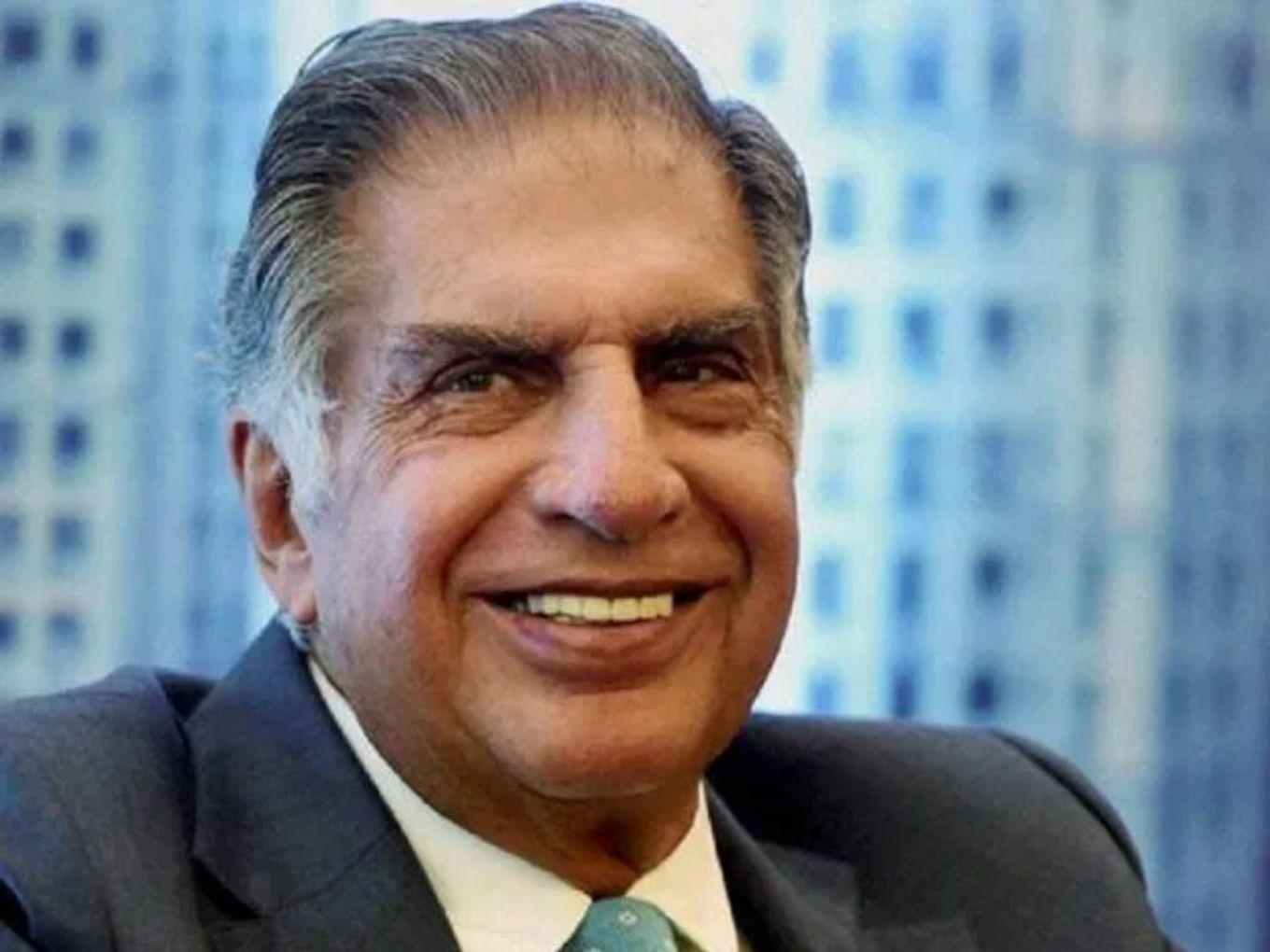
Ratan Tata, aged 86, breathed his last at Mumbai’s Breach Candy Hospital, where he was admitted in the intensive care unit (ICU)
Expressing condolences on his death, Snapdeal and Titan Capital cofounder Kunal Bahl said, "India has lost one of its greatest titans, a true statesman of industry."
Paytm founder and CEO Vijay Shekhar Sharma called him a legend who will inspire every generation
The Indian startup ecosystem paid rich tributes to industrialist and chairman emeritus of Tata Group, Ratan Tata, who passed away on Wednesday in Mumbai.
Tata, aged 86, breathed his last at Mumbai’s Breach Candy Hospital, where he was admitted in the intensive care unit (ICU).
Tata, who was also widely known for his philanthropy, was a role model for multiple founders. He was an inspiration for millions and was hugely popular across age groups even at the age of 86.
Tata was also an active investor in the Indian startup ecosystem, betting on the vision and commitment of entrepreneurs. Just last week, he partially exited broking platform Upstox.
He was among the early backers of giants like Paytm and Urban Company. One of Tata’s earliest investments in the startup ecosystem was in Snapdeal in 2014.
Mourning his death, Snapdeal and Titan Capital cofounder Kunal Bahl said, “India has lost one of its greatest titans, a true statesman of industry. Mr. Ratan Tata was more than just a business leader—his compassion, humility, and kindness inspired millions. His legacy will live on forever.”
Paytm founder and CEO Vijay Shekhar Sharma called him a legend who will inspire every generation.
“Entrepreneurs of next generation will miss interacting with the most humble businessman of India,” Sharma said on X, posting a photo of him with Tata.
“Ratan Tata’s true legacy isn’t just in what he built, but in the quiet ways he’s shaped lives,” wrote Gaurav Khatri, cofounder and CEO of Noise, in his tribute as he remembered the industry veteran who has touched “hearts in ways that last far beyond his lifetime” with “empathy”, “compassion” and “kindness”.
Mayank Arya, founder and CEO of YesMadam, credited Tata for laying the foundations of “the culture of possibility” which “changed the very language of ambition of India.” 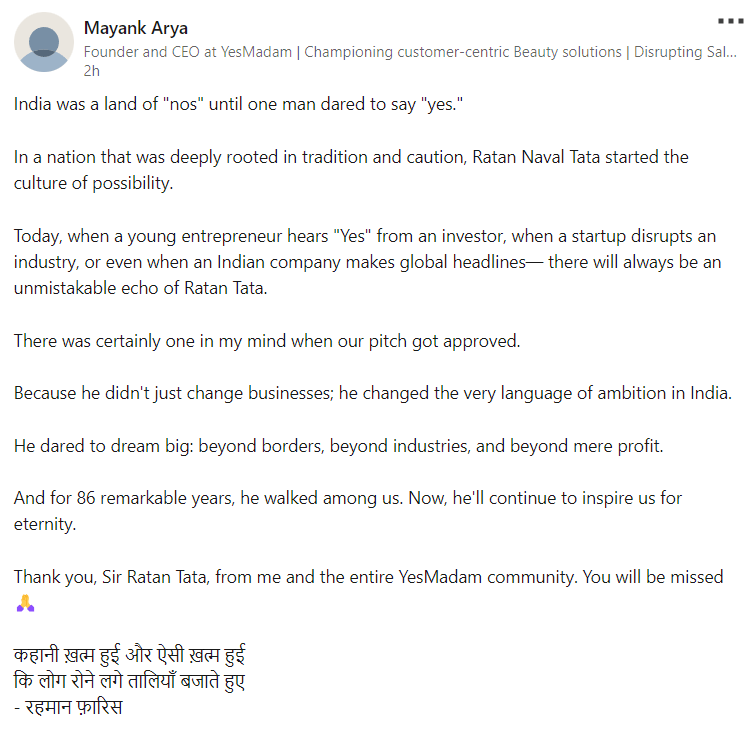
Paying his tribute to the business magnate, Microsoft cofounder Bill Gates said that Tata “left an indelible mark on India—and the world.”
Grieving Tata’s death, Ronnie Screwala, cofounder and CEO of UpGrad, said that his passing away has left a “deep void in India’s heart” while recognising his contribution to the nation’s “immense progress”.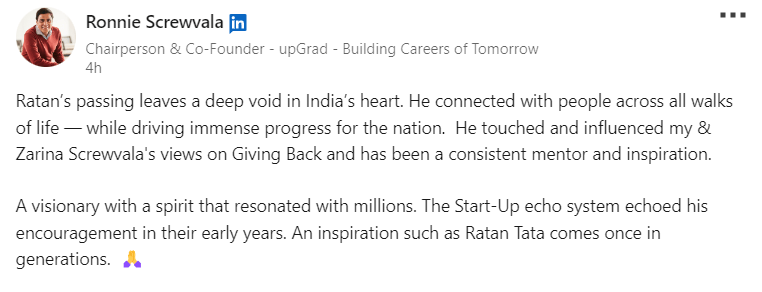
Tata took the reins as chairman of Tata Industries in 1981. Almost a decade later, he took over as the chairman of Tata Sons, the holding company of the Tata Group, following in the footsteps of giants such as Jamsetji Tata, Dorab Tata and JRD Tata.
He transformed the group into a multinational corporation with acquisitions of high-profile brands such as Tetley, Corus Jaguar Land Rover, Brunner Mond and Daewoo, among others.
During his 21-year stint as chairman and chief executive, Tata Group saw its revenues grow multifold to nearly $100 Bn in 2012 from $5.7 Bn in 1991.
In his decade-long tryst with the Indian startup ecosystem, Tata backed more than 50 homegrown startups — including ride-hailing major Ola, health and fitness startup CureFit, auto marketplace CarDekho, eyewear major Lenskart, kids-focussed omnichannel marketplace FirstCry, consumer service platform Urban Company, and the list goes on.
In one of his interviews, Tata famously said that he viewed his investments in startups as a “learning experience.”
During an event in Mumbai in 2016, Tata reportedly said that startups “are an embodiment of creativity and innovation in young India,” and he invests in new ventures if “the idea excites him”, and the first impressions of founders are good.
Tata will be cremated later today with full state honours.








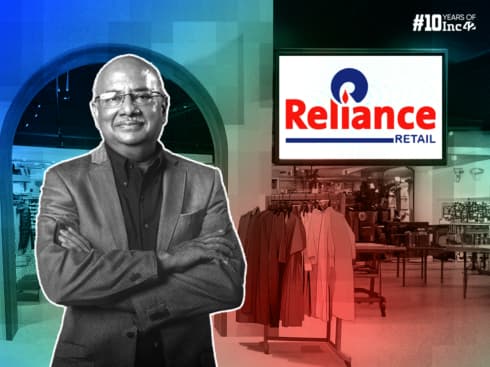
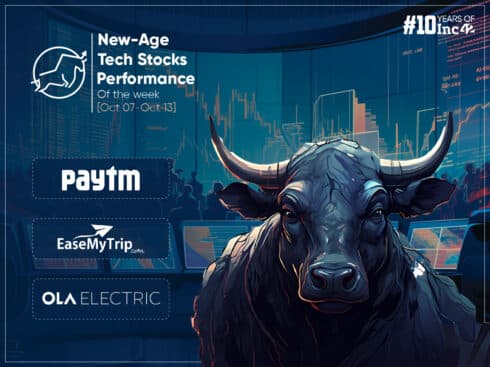





















 Ad-lite browsing experience
Ad-lite browsing experience